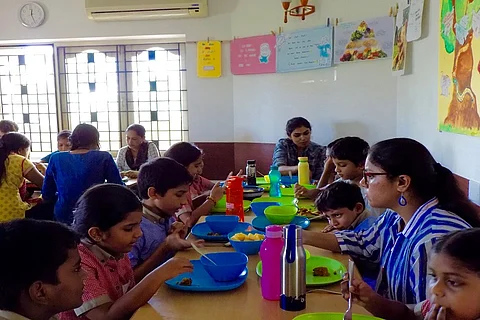

The German International School in Chennai won a 'Compassionate School Award' from People for the Ethical Treatment of Animals (PETA) in January this year.
Walk into the school and you will see a lawn full of chickens, rabbits, ducks, goats and even a cow. But the presence of animals is not the only reason why the school prides itself as an animal-friendly environment.
Going vegan
From October 2016, the school decided to serve 100% vegan meals and avoid using animal products on campus. The children have three meals in school -- breakfast, lunch, and evening snack.
“We called all the parents, asked them to taste 45 varieties of vegan food and they liked it. We had called a Homeopathy doctor who informed the parents about vegan food. Our students also like all the food that is being served to them,” says Thomas A Pallushek, Advisor for International Schools, Asia Pacific.
The student population of the school, which follows the Edexcel curriculum, is quite small. It has about 50 students in all, from KG to Class XII, and they come from different parts of the world.
Sandhya Mohan, Admissions Manager, says, "We did not cut off all products immediately. We slowly cut meat, eggs and then butter. It was a success."
But is it advisable for growing children to eat vegan meals?
Vegan by choice?
The school authorities claim that they did not compel the students to become vegan. However, although children are permitted to bring home food on Thursdays, they are advised not to bring meat.
“Our main aim is to provide one meal without meat a day. Not all the students are vegan but in school they eat only vegan food. We experiment a lot -- bake our own bread, make seitan (a meat substitute made of wheat). We also make pizza and biriyani using alternatives,” says Sandhya.
The menu is decided by the chef and Sandhya helps him with vegan recipes. Currently, the menu has a wide range of dishes that sound quite exciting: barbecue pasta burger, smashed chickpea, avocado sandwich, soft shell taco, garlic noodles, diced apple, beans sprouts salad, shepherd’s pie, chef special whole wheat pizza, red Thai curry with steamed rice, Italian herb bread, falafel onion rings and so on.
Sandhya reiterates that the school does not use any resources that are made from animals and will avoid doing so in future as well.
Vegan meals and nutrition
Speaking to TNM, a nutritionist from Chennai cautioned that the intake of vegan food on a regular basis can led to deficiencies.
“Vegan food should be served to children for a short duration and not for long because the children will not be getting proteins and some other nutrients for a long time," she said.
The nutritionist, who did not wish to be named, added that if they develop any diseases at a later stage which requires them to eat certain foods, they may refuse to do so.
"Vitamin B12 is there in plant sources also but the availability is less. Also, plant based proteins are available but some children are allergic to soy. Vitamin B12 is mainly for energy metabolism, protein is for growth and development, so it is necessary for children. If the children are deficient in Vitamin B12, they may be tired or feel weak," she opined.
The German International School says that the meals they serve are wholesome and nutritious.
Sandhya says, “All nutrients are present in all green vegetables, except B12 which needs to be given as a supplement. We also had a nutritionist from Germany who came and helped us in planning the diet."
Growing up animal-friendly
Three years ago, the school started adopting abandoned animals from streets.
“We first got a puppy who was about to be eaten by crows. From then on, we have been fostering animals. It is not right to eat animals when we have them running around in the lawns. We used to serve pork, cheese and fish earlier,” says Sandhya.
Sandhya claims that many children who were obese earlier have lost a lot of weight because of dietary changes and that they're happy to come to school.
Asked about going vegan, a Class 11 student said, "During my research, I found out that 20 percent of man-made pollution comes from the meat industry, putting factory farming ahead of transportation in contributing to the greenhouse effect. I can spare about 50 animals per year by eliminating animals from my plate and I have lots of friends who are vegetarian, vegan, or trying to eat less meat."